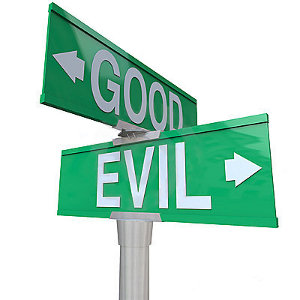The following is an excerpt from Money, Sex, Power & Faith: The Convergence of Culture.
Its been said Alaskans have hundreds of words for different kinds of snow, and Hawaiians have almost as many for rain. Yet though we are equally immersed in the precipitation of money, as Paul Hawken pointed out in The Ecology of Commerce, we only have two words to describe our profits – gross and net. Granted, Alaskans and Hawaiians have been familiar with what they’re submerged in for quite a while longer than we’ve been submerged in money, and perhaps we’ll eventually expand our vocabulary regarding our chosen life force, but it’s not going to happen with dichotomous thinking.
Much of this extends from our fascination with simply chewing on the fruit of the knowledge of good and evil, trying as often as possible to swallow the idea that the words we use to define ourselves are good, while the words we use to define others are evil. In the case of the American political system, for example, the simplification of deducing all of the flavors of a melting pot society into merely “conservative” or “liberal” leaves the system downright dysfunctional. It may very well be we have not yet matured in our scope of understanding life between the extreme dichotomies of good and evil, or that our language has not quite evolved to describe every facet of creation that finds its place in the span between them.
As David Houle and Tim Rumage wrote in This Spaceship Earth, “It has been more than 10,000 years since the beginning of the Agricultural Age, and with it the beginnings of civilization, society and religion. Some of the foundational thinking of humanity’s relationship with the world, which first came into being during this time, still prevails. We carry this foundational thinking as a filter through which we still look at the planet.”
Perhaps, if we can expand our thinking beyond the limitations of such simplicity as either/or, and adopt more of a yes/and mentality, our language may yet prove pivotal to our salvation. Yet we will have to pragmatically explore the world we’ve chosen as superior and ask ourselves why. Especially for those of the religious inclination, who defend ideas above their proclaimed virtues, as dogma spelled backwards is “am God,” there must be an examination as to the true genesis of the various words proclaimed as true, and a more rigorous search for the larger Truth beyond them.
Order your copy of Money, Sex, Power & Faith today!

